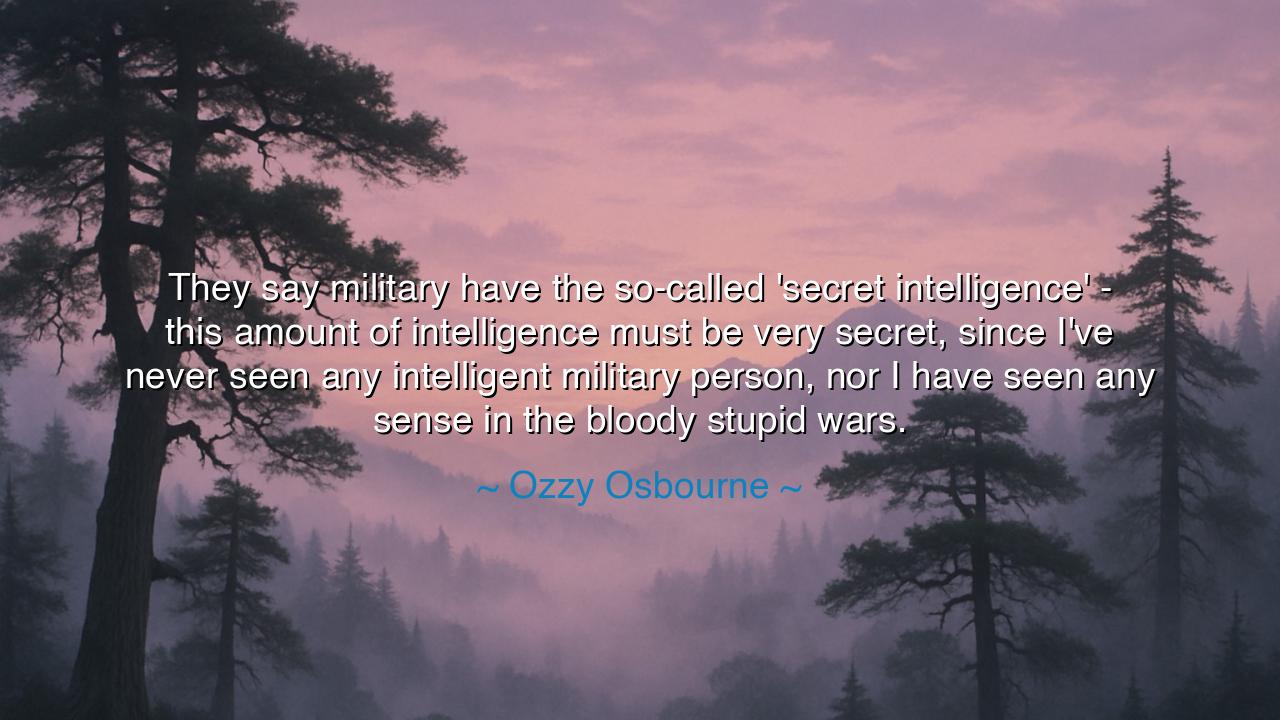
They say military have the so-called 'secret intelligence' - this
They say military have the so-called 'secret intelligence' - this amount of intelligence must be very secret, since I've never seen any intelligent military person, nor I have seen any sense in the bloody stupid wars.






In this sharp and irreverent reflection, Ozzy Osbourne, the Prince of Darkness turned philosopher of the human condition, cuts through the illusion of glory that often surrounds war and those who wage it. “They say military have the so-called 'secret intelligence' — this amount of intelligence must be very secret, since I've never seen any intelligent military person, nor have I seen any sense in the bloody stupid wars.” Beneath the sarcasm and the humor lies a deeper cry — a cry against the madness of conflict, against the machinery of destruction masquerading as order, against the arrogance that calls itself intelligence while burying generations in graves of its own making. His words, though rough in tone, strike at an ancient and tragic truth: that war is often born not of wisdom, but of folly, and that those who call themselves “strategists” frequently forget the sanctity of the lives they command.
The origin of this quote comes from Osbourne’s outspoken criticism of political and military authority, a sentiment shaped by his youth in postwar Britain. Growing up in the industrial city of Birmingham, he saw firsthand the scars that war left upon families — fathers lost, sons broken, mothers waiting by silent doors. He came of age in the shadow of the Second World War and matured in the chaos of Vietnam, watching governments justify bloodshed in the name of peace, and nations trade youth for ideology. His irreverence, then, is not the sneer of ignorance but the protest of a man who has seen the cost of so-called “intelligence.” It is the voice of the everyman crying out against the cold detachment of power — the faceless intelligence that makes decisions for those who must pay for them in blood.
To understand his meaning, one must strip away the jest and see the moral beneath it. When Osbourne mocks “secret intelligence,” he is exposing the irony of human civilization: that those entrusted with the highest levels of knowledge often use it to destroy rather than to heal. The phrase itself — “secret intelligence” — carries a double edge. Intelligence should enlighten; secrecy should protect. Yet combined, they become a shield for deception and manipulation. Across history, kings and generals have justified calamity in the name of “strategy.” Empires have fallen upon lies whispered in the corridors of power. And the soldier, the innocent, the unknowing — they have borne the cost of those secrets, those decisions made by men who mistook cleverness for wisdom.
History is filled with examples of this grim paradox. Think of World War I, when millions of young men were sent to die in the trenches for causes they barely understood — pawns in the games of rulers who spoke of honor while hiding their ignorance. The generals, armed with “intelligence,” believed that more blood would bring victory, yet their strategies led only to ruin. The poet Wilfred Owen, himself a soldier, called it “the old lie” — the belief that it is sweet and fitting to die for one’s country. His words, like Osbourne’s, were not born of hatred for soldiers but of compassion for their suffering. For the true fool is not the one who fights, but the one who commands without conscience.
Yet Osbourne’s criticism also carries a strange tenderness, hidden beneath its cynicism. When he says he has “never seen any intelligent military person,” he is not mocking the bravery of individuals but the system that consumes them. He sees the soldier as a victim of a machine that calls itself righteous while grinding human spirit into dust. His rage is not against courage, but against the blindness that guides it. He questions how humanity — capable of music, art, invention, and love — can still turn its intelligence toward destruction. It is the eternal question of the philosophers: how can creatures of reason be so endlessly irrational?
In his coarse yet truthful way, Osbourne joins a lineage of voices — from Lao Tzu to Tolstoy — who have spoken against war’s absurdity. Lao Tzu taught that “weapons are tools of fear,” to be used only with sorrow. Tolstoy called war “the product of greed and deception.” And here stands Ozzy, the modern bard of chaos, echoing the same ancient wisdom in the language of the street: that there is no intelligence in killing, no wisdom in conquest, no victory in blood. He may not wear a scholar’s robe, but his cry is that of the prophet — mourning a humanity that still has not learned that peace is the highest form of intelligence.
So, my child, learn this from his words: never mistake cleverness for wisdom, nor strength for virtue. The world is full of systems that boast of “intelligence” — political, military, corporate — but true intelligence is measured not in secrets kept, but in lives saved, hearts understood, and compassion shown. When you see men exalting the machinery of war, remember the cost that lies beneath their pride. Ask not how strategic their plans are, but how human their hearts remain.
And finally, take this lesson into your own life: let your intelligence serve peace, not power. Be brave enough to question the voices that call for violence, even when they wear uniforms of authority. The clever may win wars, but only the wise can prevent them. As Ozzy Osbourne, unlikely sage of our age, reminds us — if intelligence leads only to destruction, then it is not intelligence at all. True wisdom is the courage to refuse the senseless and to build a world where no man must die for the vanity of another.






AAdministratorAdministrator
Welcome, honored guests. Please leave a comment, we will respond soon